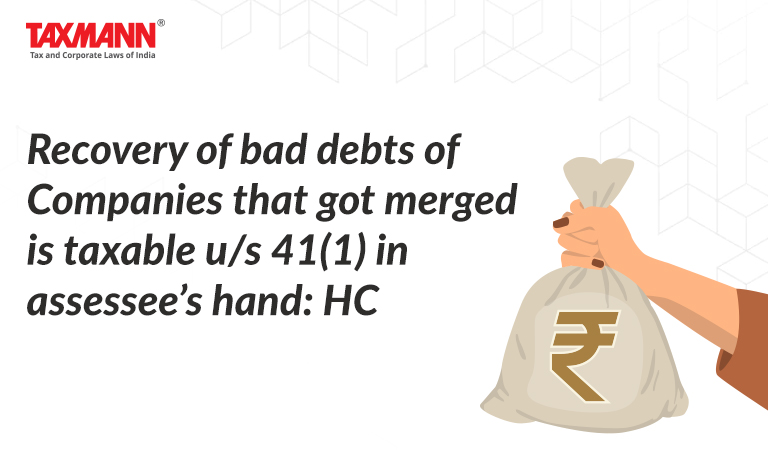Recovery of bad debts of Companies that got merged is taxable u/s 41(1) in assessee’s hand: HC
- Blog|News|Income Tax|
- 2 Min Read
- By Taxmann
- |
- Last Updated on 21 December, 2022

Case Details: Sundaram Finance Ltd. v. JCIT - [2022] 145 taxmann.com 329 (Madras)
Judiciary and Counsel Details
-
- S. Vaidyanathan & C. Saravanan, JJ.
- R. Venkatanarayanan for the Appellant.
- T. Ravikumar, Sr Standing Counsel for the Respondent.
Facts of the Case
During the relevant assessment year, the assessee recovered certain bad debts of the companies, which got amalgamated with the assessee. The assessee contended that the bad debts recovered belonged to a non-existent company and hence not taxable in its hands as it was not an assessee for the purpose under section 41.
AO treated such recovery as income of the assessee and concluded the assessment proceedings accordingly. Aggrieved by the order, the assessee filed an appeal to CIT(A) but with no success which was further affirmed by the Madras Tribunal. The assessee preferred the appeal to the Madras High Court.
High Court Held
The Court held that section 41 should be considered as a complete code as far as the changeability of profit is concerned. Section 41(1) cannot be read in isolation with 41(4).
The recovery of debt is a right that is transferred along with other rights as part of the transfer process. If the law allows the transferor (the person transferring the debt) to treat the debt as irrecoverable and claim a deduction for it, it makes sense that the transferee (the person receiving the debt) should also have the same right.
Therefore, the court upheld the order of lower authorities and dismissed the assessee’s appeal. Thus, the recovery of such bad debts will be taxable in the hands of the assessee.
List of Cases Reviewed
-
- Sundaram Finance Ltd. v. Jt. CIT [IT Appeal Nos. 72 and 73 (Chny.) of 2015, dated 4-9-2019] affirmed.
- CIT v. P.K. Kaimal [1980] 4 Taxman 319/123 ITR 755 (Mad.) (para 9)
- Saraswathi Industrial Syndicate Ltd. v. CIT [1990] 53 Taxman 92/186 ITR 278 (SC) (para 9)
- CIT v. T. Veerabhadra Rao [1985] 22 Taxman 45/155 ITR 152 (SC) (para 9) distinguished.
List of Cases Referred to
-
- Sundaram Finance Ltd. v. Jt. CIT [IT Appeal Nos. 72 & 73 (Chny.) of 2015, dated 4-9-2019]
- CIT v. P.K. Kaimal [1980] 4 Taxman 319/123 ITR 755 (Mad.) (para 3)
- Saraswathi Industrial Syndicate Ltd. v. CIT [1990] 53 Taxman 92/186 ITR 278 (SC) (para 3)
- CIT v. T. Veerabhadra Rao [1985] 22 Taxman 45/155 ITR 152 (SC) (para 5).
Disclaimer: The content/information published on the website is only for general information of the user and shall not be construed as legal advice. While the Taxmann has exercised reasonable efforts to ensure the veracity of information/content published, Taxmann shall be under no liability in any manner whatsoever for incorrect information, if any.

Taxmann Publications has a dedicated in-house Research & Editorial Team. This team consists of a team of Chartered Accountants, Company Secretaries, and Lawyers. This team works under the guidance and supervision of editor-in-chief Mr Rakesh Bhargava.
The Research and Editorial Team is responsible for developing reliable and accurate content for the readers. The team follows the six-sigma approach to achieve the benchmark of zero error in its publications and research platforms. The team ensures that the following publication guidelines are thoroughly followed while developing the content:
- The statutory material is obtained only from the authorized and reliable sources
- All the latest developments in the judicial and legislative fields are covered
- Prepare the analytical write-ups on current, controversial, and important issues to help the readers to understand the concept and its implications
- Every content published by Taxmann is complete, accurate and lucid
- All evidence-based statements are supported with proper reference to Section, Circular No., Notification No. or citations
- The golden rules of grammar, style and consistency are thoroughly followed
- Font and size that’s easy to read and remain consistent across all imprint and digital publications are applied



 CA | CS | CMA
CA | CS | CMA
